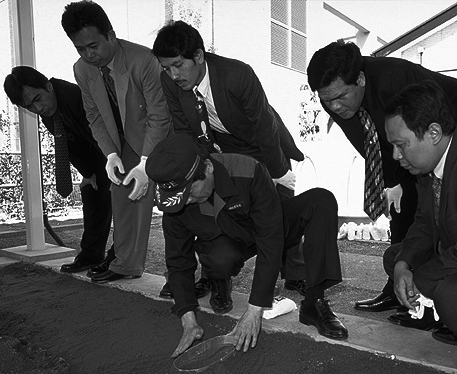Japan's Official Development Assistance White Paper 2009
(5) Policy Formulation and Institution Building
For the sustainable growth of developing countries, not only is the establishment of economic and social infrastructure important, but so too is policy formulation, institution building, and human resource development. In order to realize it, support is necessary for efforts like eradicating corruption, legal and institutional reforms, improving the efficiency and transparency of public administration, and strengthening the administrative capacity of local governments.
<Japan's Efforts>
As part of its assistance for policy formulation and institution building, Japan promotes assistance for legal and judicial system development. Legal and judicial system development serves to develop countries through self-help efforts that are based in good governance. Support for this sector is a typical example of person-to-person cooperation, and plays a part in Japanese assistance with a visible face. Moreover, if the legal and judicial systems of developing countries can be developed through it, then this will lead to facilitating the activities of Japanese companies. The Basic Policy of the Assistance for Legal and Judicial System Development (Note 26) was formulated at the Director-General level meeting of related ministries in April 2009, and approved at the Overseas Economic Cooperation Council. This policy compiles the basic philosophy regarding legal and judicial system development and describes the current situation, challenges, and the future direction of assistance to different countries, especially those in Asia. Japan's assistance for developing legal and judicial systems is assistance that comes through its "soft power," and plays an important role in underpinning the strengthening of Asia's growth potential.
Japan also carries out a variety of efforts to assist with establishing democracy, including institution building such as for legal, judicial, administrative, civil service, and police systems. Other efforts include support for strengthening organizations, electoral assistance, strengthening civil society, and support for empowering women. It also provides support to combat corruption, and to improve statistical competence and local administration capacity. Japan has provided assistance to Asian countries like Thailand, Viet Nam, Cambodia, Bangladesh, and Pakistan; Latin American and Caribbean countries such as Paraguay and Honduras; as well as African countries including Tanzania and Zambia.
Moreover, Japan has extended policy formulation and institution building assistance not only to specific projects, but to financing developing countries' national accounts. For example, Japan has provided Indonesia with Development Policy Loans (DPL) since FY2004. This DPL is co-financed with the World Bank and the Asian Development Bank (ADB). The DPL focuses on efforts to carry out reform in the areas of stabilization of the macro-economy, improvement of the investment climate, improvement of public finance management and governance such as anti-corruption, as well as poverty reduction.
In the area of improving the capability of police agencies that constitute a cornerstone in maintaining domestic order, Japan has been transferring the knowledge, experience, and technology of the Japanese police while also developing facilities and providing equipment. The National Police Agency dispatches experts to and accepts trainees mainly from Asian countries such as Indonesia and the Philippines, through which the Agency attempts to transfer the trustworthy attitude of Japanese policy and its techniques regarding inspections and crime identification. In addition, Japan provides equipment as grant aid for wireless communication systems, Koban, and equipment for criminal investigation activities. This has contributed in terms of ensuring safety for citizens by enabling the authorities to respond rapidly to calls from citizens, and the technology has been improved in the inspection based on physical evidence.

Photo: JICA
Notes:
(26) It was affirmed at the thirteenth meeting of the Overseas Economic Cooperation Council held in January 2008 that assistance for legal and judicial system development should be strategically promoted as one of the priority fields of its overseas economic cooperation, with the basic policy having been created in light of this.
Legal and Judicial Development Project (Cambodia)
After the 20-year civil war, fundamental legal structures had not been adequately developed, and legal human resources were also extremely scarce in Cambodia. Japan began the Legal and Judicial Development Project in 1999. Drafting a civil code and code of civil procedure, enacting these as law with promulgation of the code of civil procedure in July 2006 and the civil code in December 2007, and drafting affiliated laws and ordinances by a combined Japanese-Cambodian drafting team were assisted in the project. Since 2008, developing affiliated laws and ordinances, strengthening the capacity of the Ministry of Justice and activities to disseminate new laws in the aim of appropriately applying both of these codes have been assisted. Japan is also supporting the fostering of legal human resources like judges and public prosecutors, and is working toward the realization of a fair judiciary in an integrated manner.

Cambodian civil code and code of civil procedure (Photo: JICA)
